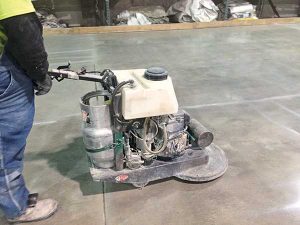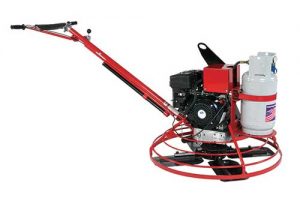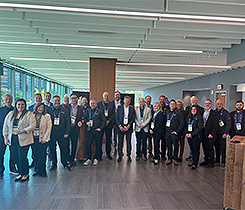Manufacturers rolling out propane-fueled equipment for concrete contractors

This Pioneer Eclipse burnisher is one propane-fueled asset contractors can incorporate into their equipment arsenal. Photo courtesy of Pioneer Eclipse
It takes a lot of grit to do concrete work, and propane is on the job from pouring to polishing.
Some contractors own the equipment outright, while others economize by patronizing rental centers to complete a particular procedure, of which there are many throughout the process.
Propane-powered buggies, screeds, trowels, scrapers, grinders, burnishers, polishers, refreshers, shotblasters and dust extractors contribute to the construction, completion, restoration, enhancement and subsequent maintenance of a concrete floor.
LP gas dust extractors are an important element for reducing the hazards of breathing in harmful particles flying about, while some of these other terms essentially refer to the amount of desired bite or grit needed for finishing a surface to the desired specifications.
Laying concrete can be complicated. Not only does the material require the correct composition for the pour, but also application errors by the mason or adverse climate conditions can inflict negative consequences. Finishing is accomplished in stages, as a given task can leave tool markings, scrapes and imperfections to be remedied by the next pass.
“We have seen a significant growth in the demand for propane equipment in our industry, and the main reason is that concrete contractors like the quick and convenient setup on the job site – no wiring and no generators needed, just roll it out of the trailer and start working,” says Monika Angelova, marketing manager at Superabrasive Inc., which manufactures a line of grinders, burnishers and dust extractors that leverage propane’s benefits for these types of applications.
“That is a big time and money saver for many in our industry,” Angelova says. “Propane is readily available everywhere, and you just switch tanks with minimum downtime. Our grinding and polishing machines are mainly used on indoor projects, both large and small, for floor prep, or in many cases polishing.”
“Propane-powered floor maintenance equipment is the greenest choice based on labor savings, machine emissions, electricity usage and purchase price,” adds Whit Beverly, president of Aztec Products, noting how LP gas beats battery-powered machines in several ways, such as less weight, more power and unlimited runtime via exchanging cylinders versus hooking up to a charger.
Exchanging tanks
Bartell Global’s Josh Locke says contractors consider several factors when deciding whether to choose his company’s battery ride-on floor scrapers or his propane models.
“There are different tools for every job, and finding the right ride-on floor scraper is the same type of situation,” he says. “If you’re working in an area with tenants or neighbors that can be easily disturbed, chances are a battery-powered floor scraper is what you need. Because these machines have electric motors, they tend to be fairly quiet and can make it possible to work in near proximity to office workers and other noise-sensitive tenants.”
Zero emissions of a battery-operated machine also means that it can be used indoors in enclosed spaces, Locke says.
“Arguably the biggest benefit of battery ride-on floor scrapers is that no customer will ever tell you it can’t be used,” he adds. “There is no pollution when the machine is in use.”
But propane is also an attractive option for contractors, mainly as it relates to power generation and maintaining production on extensive jobs.
“Not needing to worry about power on the job site is a huge benefit to using a propane floor scraper,” Locke says. “If you’re working in an area where charging the battery of your ride-on floor scraper every night isn’t going to be a possibility, propane begins to make more sense.
“Additionally, there’s little downtime between changing tanks when you run out,” he adds. “If you’re running 16-hour days, it’s a lot easier to change a propane tank than it is to wait for the machine to charge, change the battery pack or use a second machine. If long days and ultimate production are what you’re after, though, propane might be for you. With the ability to have very little downtime and being used in areas without electricity, this is an attractive option for the right contractor.”
Saving time and money
Once the mixer backs up to the job, propane-powered transports carry concrete to a pouring site’s tightest corners.
Allen Engineering rolled out its new AR16 propane-powered buggy at January’s World of Concrete convention in Las Vegas.
“From interior restoration work to plant maintenance, the need for cleaner emissions continues to grow,” says rental sales manager Garry Haferbier, “and because of this we believe this product will make an excellent addition to rental fleets all over the country.”
The unit produces less than 1 percent carbon monoxide, making it compliant with governmental standards.
“Thanks to the closed fuel system, engine components will run cleaner with less wear and tear, which will result in less maintenance,” Haferbier says. “Plus the use of propane allows equipment to reliably operate without carburetors getting gummed up due to the ethanol found in gasoline.
“With typical propane conversions, there is a fear of loss of power,” says Haferbier, but he notes “the power and load [of the AR16] are unchanged compared to its gasoline-powered counterpart.”
Similar to trowels, screeds serve as a giant squeegee to even out the fresh concrete. Ligchine International’s Boss 240 screed with a propane-option 57-hp Kubota engine is billed as “the world’s largest boom-operated screed,” complete with zero-turn drive, an on-board pressure washer and high intensity surround LED lighting.
Also at World of Concrete, Concrete Polishing Solutions (CPS) unveiled its propane-powered CPS Rover ride-on, zero-turn grinder and polisher with a 32-in. path that exerts 760 pounds of pressure.
“While remote-controlled grinders available on the market improve worker exhaustion, the disconnect between operator and grinder can lead to poor end results for the customer, as well as an increased chance of machine damage because the operator can’t ‘feel’ the performance of the grinder,” says CPS CEO David Padgett.
Introducing its first arrival in a new line of Pro machines, CPS’ G-320D propane walk-behind 31-hp floor grinder “offers cordless operation without sacrificing the power” and productivity that contractors “have come to expect.” A three-head design with new and improved flex-head technology contours to the floor, and a companion LP gas dust collection unit is also available.
Angelova of Superabrasive reports that the company’s Lavina concrete line debuted several new propane products at World of Concrete, such as the V32G-X dust extractor, the 32-in. six-head heavy-duty L32G-X grinder and the remote-controlled 38-in. L38GR-X grinder.
“And since these grinders run on propane, they do not require any electrical wiring or generators and take literally no time to set up on the job site, saving contractors time and money,” Angelova says.

















